Top 20 Best Speeches Ever Made by US Presidents
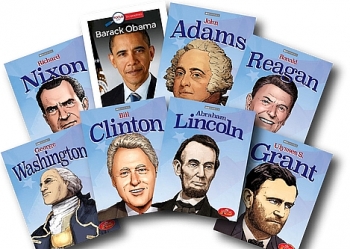 What is the Most Common Zodiac Sign of U.S. Presidents What is the Most Common Zodiac Sign of U.S. Presidents |
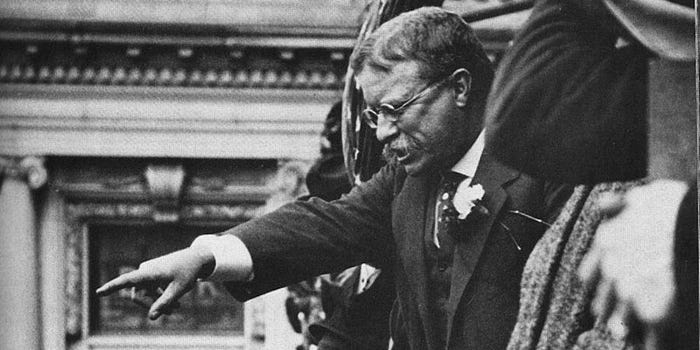 How Many US Presidents Have Been Assassinated? How Many US Presidents Have Been Assassinated? |
| Contents |
What is the Best, Most Memorable Presidential Speechs?
Our president's speech is often remembered by the public for his excellent use of words and eloquence.
KnowInsiders's experts found that: Most of the presidential speeches that are said to be the best are very brief, but contain a lot of messages and have a lot of impact.
Despite the fact that not all presidential speeches are written by the president himself, most are by a team of personal assistants and secretaries. However, great speeches are often written by the president himself or have a very distinct mark.
U.S Presidents usually don't need to spend a lot of time expressing their views, thoughts and feelings on special occasions, but just a few carefully chosen words and sentences.
However, good words and beautiful ideas in speeches are only considered great and unforgettable in special events at the national level.
Therefore, the presidential speech is also a rare document, associated with American history in special times such as crises, facing great challenges or dangers, etc.
Presidential speeches can inspire, uplift, and encourage large numbers of Americans and influence the nation.
Here are the best and most inspirational presidential speeches of all time, compiled and featured by KnowInsiders.com.
Top 21 Greatest and Most Inspiring US Presidential Speeches Of All Time
1. Abraham Lincoln’s Gettysburg Address
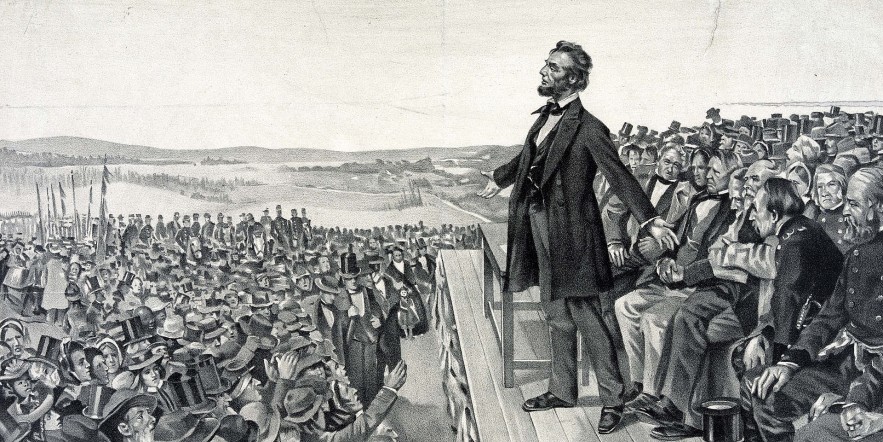 |
| The Greatest US Presidential Speeches by President Abraham Lincoln - Getty Image |
Most of the rankings and votes consider this speech to be in the Top 1 of the best presidential speeches in American history.
Date: November 19, 1863. It was delivered by President Abraham Lincoln in November of 1863 during the American Civil War.
Historical Background:
President Lincoln went to the location to dedicate the Soldiers' National Cemetery four months after Union forces at Gettysburg defeated the Confederacy. Lincoln used the opportunity to share his thoughts on the war and its significance in what were meant to be succinct, situation-appropriate remarks.
The five surviving manuscripts of the speech all use slightly different wording, and there is no known final copy. The speech was only 10 sentences long and was delivered in two and a half minutes.
The ten sentences he delivered would go on to become one of the most well-known speeches in American history, a model for noteworthy statements made centuries later, and even the basis for the wording of other nations' constitutions.
Best Quote: "... that we here highly resolve that the dead shall not have died in vain; that the Nation shall under God have a new birth of freedom, and that Governments of the people, by the people and for the people shall not perish from the earth.”
2. George Washington's Farewell Address
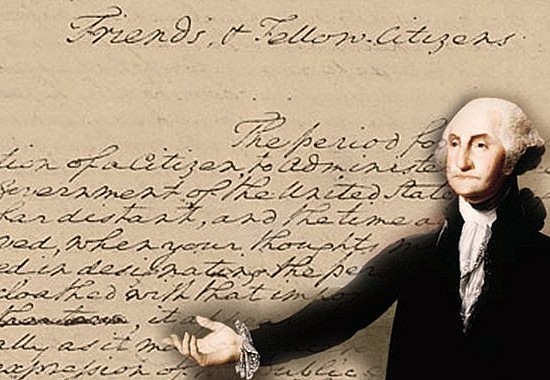 |
| George Washington's Farewell Address |
Date: September 17th, 1796
Historical Background:
President Washington actually prepared a draft of his farewell speech to the American people after his first term, but given the state of the country at the time, he ultimately decided to run for reelection.
Near the end of his second term in office, George Washington, the nation's first president, wrote to the American people to announce his resignation. Despite the worries of many who feared for the future of the United States without Washington, the speech reassured the young nation that it no longer required his leadership.
Washington seized the opportunity to offer advice for the good of the country. After seeing the growing rift between the Federalist and Democratic-Republican parties, much of his advice was to advise against political parties, factions, and other animosities (domestic and foreign) that would ultimately undermine the integrity and effectiveness of the American government.
Best Quote: “This spirit [of party], unfortunately, is inseparable from our nature, having its root in the strongest passions of the human mind … [but] the disorders and miseries which result gradually incline the minds of men to seek security and repose in the absolute power of an individual; and sooner or later the chief of some prevailing faction, more able or more fortunate than his competitors, turns this disposition to the purposes of his own elevation, on the ruins of public liberty.
“Without looking forward to an extremity of this kind (which nevertheless ought not to be entirely out of sight), the common and continual mischiefs of the spirit of party are sufficient to make it the interest and duty of a wise people to discourage and restrain it. It serves always to distract the public councils and enfeeble the public administration. It agitates the community with ill-founded jealousies and false alarms, kindles the animosity of one part against another, foments occasionally riot and insurrection. It opens the door to foreign influence and corruption, which finds a facilitated access to the government itself through the channels of party passions … A fire not to be quenched, it demands a uniform vigilance to prevent its bursting into a flame, lest, instead of warming, it should consume.”
| Washington, the country's first President and the key figure in navigating murky political precedents, helped to set expectations for incoming candidates. In front of the American people, he expressed his gratitude and announced his decision not to seek reelection for a third time. In his final remarks, he urged people to develop their patriotism and to be wary of foreign alliances. Despite the fact that the speech was never delivered, it was remembered in newspapers all over the country. |
3. Lincoln's Second Inaugural Address
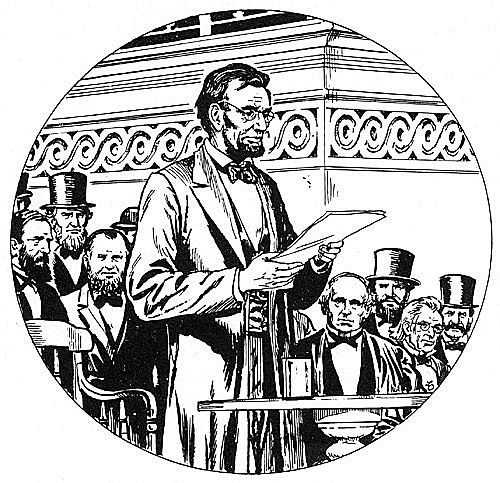 |
| Lincoln’s Second Inaugural |
Date: March 4, 1865
Historical Background
President Lincoln gave his second inaugural speech on March 4, 1865, as the bloody Civil War was coming to an end. Lincoln paused as the time for North-South reconstruction drew near to consider what had been lost and what might be gained. It only had 700 words and was spoken in a little over five minutes.
Best Quote: With malice toward none, with charity for all, with firmness in the right as God gives us to see the right, let us strive on to finish the work we are in, to bind up the nation’s wounds, to care for him who shall have borne the battle and for his widow and his orphan, to do all which may achieve and cherish a just and lasting peace among ourselves and with all nations.”
4.Ronald Reagan’s Speech at the Berlin Wall
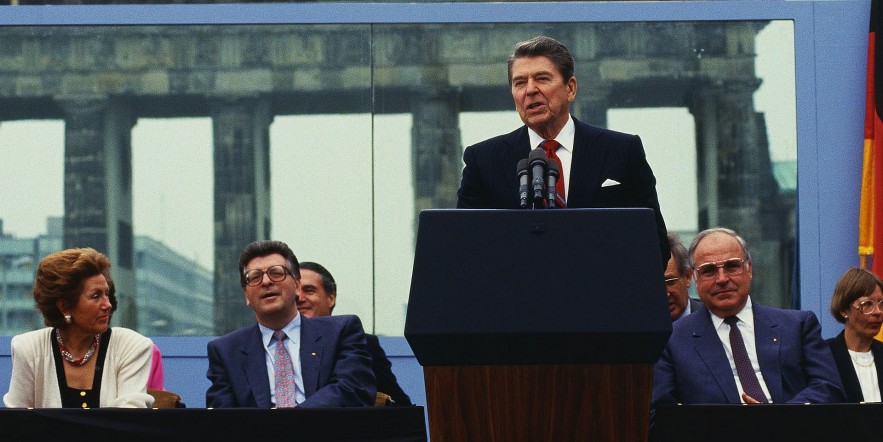 |
| Ronald Reagan’s Speech at the Berlin Wall |
Date: In June of 1987
Historical Background
Perhaps the most enduring quote from President Reagan's tenure was that one.
In June 1987, Reagan gave his now-famous speech at the Berlin Wall.
The wall was built in 1961 to stop Germans from fleeing Communist-run East Berlin into Democratic West Berlin.
Moreover, it represented the conflict between the USSR and US during that time.
In his speech, President Reagan urged the Soviet authorities to destroy the concrete and barbed-wire fence.
At the time, the speech was barely covered by the media, and many Soviet officials called it "absurd."
Former West German Chancellor Helmut Kohl and others praised Reagan and his speech as "a stroke of luck for the world, especially for Europe."
Best Quote: "We come to Berlin, we American presidents, because it's our duty to speak, in this place, of freedom. But I must confess, we're drawn here by other things as well: by the feeling of history in this city, more than 500 years older than our own nation; by the beauty of the Grunewald and the Tiergarten; most of all, by your courage and determination."
"Our gathering today is being broadcast throughout Western Europe and North America. I understand that it is being seen and heard as well in the East. To those listening throughout Eastern Europe, a special word: Although I cannot be with you, I address my remarks to you just as surely as to those standing here before me. For I join you, as I join your fellow countrymen in the West, in this firm, this unalterable belief: Es gibt nur ein Berlin. [There is only one Berlin.]"
5.Frank Delano Roosevelt’s Pearl Harbor Address
Historical Background
On December 7, 1941, a surprise attack on Pearl Harbor, Hawaii, by the Japanese Empire cost the lives of thousands of American soldiers and destroyed 19 American ships and close to 200 aircraft.
The president addressed Congress the following day, encouraging everyone to support entering World War II.
Within an hour of the speech, Congress approved a formal declaration of war against Japan, ushering the country into World War II.
Even though the Secretary of State tried to find a peaceful solution by giving a longer speech, he spoke for just over seven minutes.
F.D.R. thought giving a succinct, to-the-point speech would have a more dramatic effect.
The speech, which was broadcast on the radio and drew the largest radio audience in American history, was heard by more than 81% of the population.
Across America, the response was overwhelmingly positive.
6.Franklin D. Roosevelt’s Inaugural Address
Date: March 4, 1933
Historical Background
Because of the Great Depression that was engulfing the country at the time, everyone in America eagerly anticipated Franklin D. Roosevelt's speech at his inauguration. Roosevelt gave a 20-minute speech filled with assurance, optimism, and promises of quick action, and he was successful.
Notable Quote: “So, first of all, let me assert my firm belief that the only thing we have to fear is … fear itself — nameless, unreasoning, unjustified terror which paralyzes needed efforts to convert retreat into advance. In every dark hour of our national life a leadership of frankness and of vigor has met with that understanding and support of the people themselves which is essential to victory. And I am convinced that you will again give that support to leadership in these critical days.”
7.Eisenhower’s “Atoms for Peace” Speech
Date: December 8, 1953
Historical Background
During World War II, Roosevelt formally approved the Manhattan Project, an American covert effort to weaponize nuclear power. Its detonation in Japan's Hiroshima and Nagasaki was authorized by President Truman in 1945 after the United States had successfully developed the atomic bomb. Thousands of people were killed as a result, and the two cities were destroyed.
Political and economic tensions between the United States and the Soviet Union after World War II quickly resulted in another conflict between the two countries, but this time the Soviet Union also had an atomic bomb.
At a time when the world was perched precariously on a precipice created by the availability of nuclear energy, President Eisenhower gave this speech to the United Nations about the very real dangers as well as the beneficial uses of nuclear energy. Beginning with this speech, a "emotion management" campaign was launched.
Notable Quote: “… the whole book of history reveals mankind’s never-ending quest for peace and mankind’s God-given capacity to build. It is with the book of history, and not with isolated pages, that the United States will ever wish to be identified. My country wants to be constructive, not destructive. It wants agreements, not wars, among nations. It wants itself to live in freedom and in the confidence that the peoples of every other nation enjoy equally the right of choosing their own way of life. … The United States knows that if the fearful trend of atomic military build-up can be reversed, this greatest of destructive forces can be developed into a great boon, for the benefit of all mankind.”
8.Franklin D. Roosevelt’s First Fireside Chat
Date: March 12, 1933
Historical Background
A few days after taking office, Roosevelt started "fireside chats," which involved entering Americans' living rooms and having conversations with them about the news using the then-relatively-new medium of radio.
On these occasions, he was able to speak for a significant amount of time without being interrupted by the press in a consoling, upbeat tone that might have been lost in writing. He purposefully crafted his message for this first fireside chat so that the average listener could understand the American banking system (and its current difficulties).
Notable Quote: “Confidence and courage are the essentials of success in carrying out our plan. You people must have faith. You must not be stampeded by rumors or guesses. Let us unite in banishing fear. We have provided the machinery to restore our financial system, and it is up to you to support and make it work. It is your problem, my friends. Your problem no less than it is mine. Together, we cannot fail.”
9.Franklin D. Roosevelt’s “Four Freedoms” Speech
Date: January 6, 1941
Historical Background
Many survivors of the Great Depression had recovered financially by 1941, but Hitler and his Nazi regime had become a new global force. The Second World War was currently raging in the Pacific and in Europe, but the United States had so far largely maintained its neutrality.
Roosevelt sought to change that in response to the atrocities taking place abroad. His State of the Union address that January highlighted four freedoms that every person is entitled to. The so-called "Four Freedoms" speech had a significant influence on American politics, culture, and values and later served as the justification for American involvement in World War II.
Best Quote: “In the future days, which we seek to make secure, we look forward to a world founded upon four essential human freedoms. The first is freedom of speech and expression—everywhere in the world. The second is freedom of every person to worship God in his own way—everywhere in the world. The third is freedom from want—which, translated into world terms, means economic understandings which will secure to every nation a healthy peace of time life for its inhabitants—everywhere in the world. The fourth is freedom from fear—which, translated into world terms, means a world-wide reduction, armaments to such a point and in such a thorough fashion that no nation will be in a position to commit an act of physical aggression against any neighbor—anywhere in the world.”
10.Eisenhower’s Farewell Address
Date: January 17, 1961
Historical Background
President Eisenhower inherited a nation that had grown significantly since he took office in terms of strength, wealth, and development. While acknowledging the pride that everyone should feel in these accomplishments, his farewell speech, which was prepared as far in advance as two years, also served to bring the American people back to earth with the sobering knowledge that how the United States uses its power and standing will ultimately determine its fate.
The Federal government's control of scientific advancement (or, conversely, the scientific-technological community's control of public policy) was among the dangers he mentioned in his speech, along with excessive government spending, an overburdened military industry, and these risks. He emphasized the significance of preserving equilibrium as the country grows in order to safeguard liberty in all spheres.
Best Quote: “Down the long lane of the history yet to be written America knows that this world of ours, ever growing smaller, must avoid becoming a community of dreadful fear and hate, and be, instead, a proud confederation of mutual trust and respect. Such a confederation must be one of equals. The weakest must come to the conference table with the same confidence as do we, protected as we are by our moral, economic, and military strength. That table, though scarred by many past frustrations, cannot be abandoned for the certain agony of the battlefield.”
11.John F. Kennedy’s Inauguration Address
Date: January 20, 1961
Historical Background
John F. Kennedy was elected as the nation's youngest president on January 20, 1961.
With his iconic inauguration speech, he urged all Americans to put their country first and ushered in a new era for the nation.
At the height of the Cold War, when Kennedy was elected, he stressed in his 14.5-minute speech the need to strike a delicate balance between maintaining friendly relations with other nations and portraying the United States as a formidable adversary.
Kennedy's inaugural speech is regarded by many as one of the best in American history.
12.Kennedy’s “We Choose to Go to the Moon” Speech
Date: September 12, 1962
Historical Background
Out of concern for national security during the Cold War, the US and USSR gave spaceflight top priority. To the surprise (and fear) of people all over the world, the Soviet Union launched the first artificial satellite ever in 1957 and sent the first person into space in 1961, proving to onlookers that its nation was a technological force to be reckoned with.
Kennedy was adamant that the US should create a space technology challenge that had a chance of success. In the early 1960s, he advised, America should focus on putting a man on the moon. At Rice University, Kennedy gave a speech intended to inspire students. In it, he emphasized the nation's technological advancements to date and his administration's determination to carry the spirit of early American explorers into the new frontier of space.
Best Quote: “We choose to go to the moon. We choose to go to the moon in this decade and do the other things, not because they are easy, but because they are hard, because that goal will serve to organize and measure the best of our energies and skills, because that challenge is one that we are willing to accept, one we are unwilling to postpone, and one which we intend to win, and the others, too.”
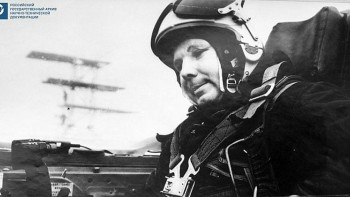 Mysterious Crash That Killed Yuri Gagarin - World's First Cosmonaut- Fack Check Mysterious Crash That Killed Yuri Gagarin - World's First Cosmonaut- Fack Check |
13.Jefferson's First Inaugural
Historical Background
Thomas Jefferson was sworn in amid controversy because Aaron Burr and Thomas Jefferson tied in the Electoral College, forcing the 1800 election to be decided in the House of Representatives. After finally winning the election and the nation teetering on the brink, Jefferson spoke of the need for compromise between the two parties controlling American politics at the time.
Best Quote: "I know, indeed, that some honest men fear that a republican government can not be strong, that this Government is not strong enough; but would the honest patriot, in the full tide of successful experiment, abandon a government which has so far kept us free and firm on the theoretic and visionary fear that this Government, the world's best hope, may by possibility want energy to preserve itself?"
14.George W. Bush - Post 9/11 Speech
Date: September 22, 2001
Historical Background
The September 11th attacks gave rise to a generation that is acutely aware of terrorism and has become desensitized to violence. President Bush addressed the country in a succinct but powerful speech while the nation was still reeling from the events of September 11th.
Bush laments the destruction and describes how, despite language barriers, prayer spread in its wake. He declares that the nation's future will be fundamentally changed and that the United States will never forget the lives lost. Bush continues by saying that despite the destruction, the country should keep making new memories.
Bush emphasized the resilience of the American people and urged them not to succumb to fear of the future because the attackers were still at large.
Best Quote: "These acts of mass murder were intended to frighten our nation into chaos and retreat. But they have failed. Our country is strong. A great people has been moved to defend a great nation. Terrorist attacks can shake the foundations of our biggest buildings, but they cannot touch the foundation of America. These acts shatter steel, but they cannot dent the steel of American resolve."
15.Lyndon Johnson’s “We Shall Overcome” Speech
Historical Background
One week after Alabama police beat civil rights marchers on the highway leading from Selma to Montgomery, President Johnson delivered his infamous speech on civil rights.
In the speech that proposed the Voting Rights Act of 1965, Johnson begins with a very impactful line.
Johnson urged all Americans to come together in support of universal, equal rights.
He urged the nation to think of everyone as Americans rather than in terms of black and white, north and south.
Johnson coined a phrase in the speech that civil rights leaders have used for decades and that brought Dr. Martin Luther King Jr. to tears.
President Johnson signed the Voting Rights Act into law, granting African Americans the right to vote, five months after delivering his speech.
Best Quote: “I speak tonight for the dignity of man and the destiny of Democracy.”
16."Truman Doctrine" Speech
Historical Background
On March 12, 1947, President Truman addressed a joint session of Congress regarding the current crises in Greece and the Turkish Straits. Truman made it clear that the US would attempt to halt the spread of Communism in both countries in accordance with the "Domino Theory," which served as justification for the Cold War.
Truman expressed his concerns about the dangers the world faced and the cost of inaction. According to historians, with this speech, the Cold War officially began and took center stage in US foreign policy for the next 40 years.
Best Quote:
"Should we fail to aid Greece and Turkey in this fateful hour, the effect will be far reaching to the West as well as to the East. We must take immediate and resolute action."
17.Barack Obama - A More Perfect Union
Date: March 18, 2008
Historical Background
Kennedy once described the US as a "melting pot," a country made up of immigrants.
Because of his previous friendship with a divisive pastor by the name of Jeremiah Wright, Barack Obama became embroiled in controversy during the 2008 Democratic primary.
During a campaign event in March, Obama gave a vehement speech about racial issues in America in general and his relationship with Wright in particular. According to some analysts, Obama's speech contributed to his victory in the Democratic primary.
Obama disregards this generalization in favor of emphasizing the scars left by America's historical internal racial and cultural conflicts. Although he is only one candidate and cannot go back in time, he asserts that reconciliation is the only path to "a more perfect union."
According to Obama, the key to overcoming adversity is to forgive, move on, and respect everyone's differences. He argues that unity acknowledges these differences.
Best Quote:
"I can no more disown [Wright] than I can disown the Black community. I can no more disown him than I can my white grandmother – a woman who helped raise me, a woman who sacrificed again and again for me, a woman who loves me as much as she loves anything in this world, but a woman who once confessed her fear of Black men who passed by her on the street, and who on more than one occasion has uttered racial or ethnic stereotypes that made me cringe."
18.Nixon's "Silent Majority" Speech
Historical Background
President Nixon used this phrase to implore the American people to support the Vietnam War in a speech given in November 1969. He was referring to the overwhelming majority of blue collar and suburban conservatives who preferred to keep quiet over march in anti-war protests or participate in the counterculture.
However, the phrase had already been used by a number of well-known people, including Spiro Agnew, Nixon's vice president.
Best Quote:
"Let historians not record that, when America was the most powerful nation in the world, we passed on the other side of the road and allowed the last hopes for peace and freedom of millions of people to be suffocated by the forces of totalitarianism."
19.Barack Obama: Remarks at the 50th Anniversary of the Selma Marches
Date: March 7, 2015
Historical Background
The Selma marches have become a defining moment in American history. Obama compares the significance of Selma to the Revolutionary and Civil Wars, in which everyone fought for equality.
The marchers weren't your typical soldiers, but they sacrificed their lives in support of a cause that is shared by people of all races. Obama claims that the fight is still going on because America had to defend Selma in the same way it did when the country's identity was in danger.
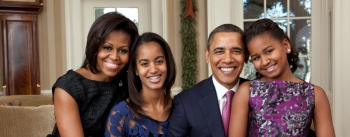 Barack Obama Biography: Family Life as 'True' US Citizens Barack Obama Biography: Family Life as 'True' US Citizens |
20.Woodrow Wilson's Second Inaugural
Date: March 1917
Historical Background
Wilson ran on the promise that "He Kept Us Out of War," but by the time of his second inauguration in March 1917, it was clear that US neutrality couldn't last. German attacks on merchant ships had increased, and several Americans had died on ships flying neutral flags. The nation was prepared for war by Wilson's speech, over which it was still deeply divided.
Best Quote:
"We are a composite and cosmopolitan people. We are of the blood of all the nations that are at war. The currents of our thoughts as well as the currents of our trade run quick at all seasons back and forth between us and them. The war inevitably set its mark from the first alike upon our minds, our industries, our commerce, our politics and our social action. To be indifferent to it, or independent of it, was out of the question."
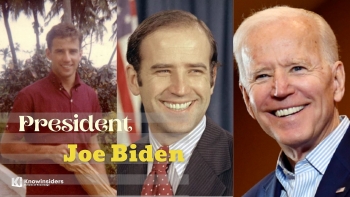 President Joe Biden: Horoscope, Astrological Prediction and Zodiac Sign Personality President Joe Biden: Horoscope, Astrological Prediction and Zodiac Sign Personality Which zodiac sign is Joe Biden? Find out the Yearly Horoscope, Zodiac Sign Personality, Astrological Prediction for the US President Joe Biden in 2022 and ... |
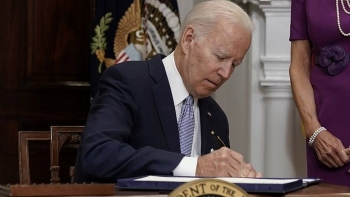 Full Text: The First Major Gun Safety Bill in the United States Full Text: The First Major Gun Safety Bill in the United States Congress passed compromise legislation this week on gun safety that is now waiting to be signed into law by President Joe Biden. Read the full ... |
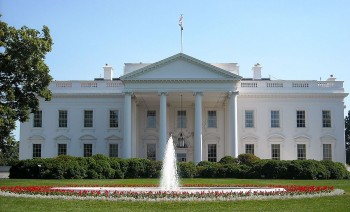 Who Was The First President To Live In The White House? Who Was The First President To Live In The White House? You know who is the first President of the United States but do you know who was the first one to live in the White ... |
 Who are the Youngest & Oldest Presidents and Amazing Facts About US.Presidents Who are the Youngest & Oldest Presidents and Amazing Facts About US.Presidents Since the founding of the country, there have been a total of 46 US presidents. Of these, who is the youngest and oldest President while ... |























